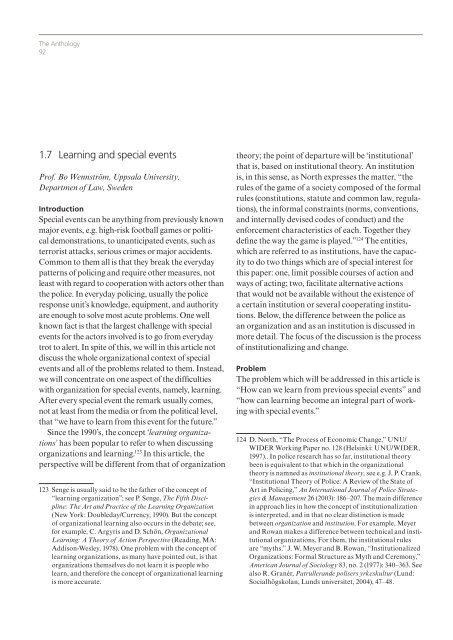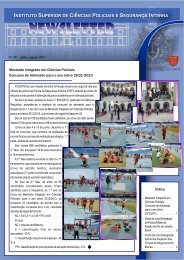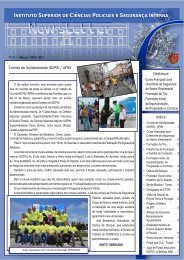The Anthology
The Anthology
The Anthology
Create successful ePaper yourself
Turn your PDF publications into a flip-book with our unique Google optimized e-Paper software.
<strong>The</strong> <strong>Anthology</strong><br />
92<br />
1.7 Learning and special events<br />
Prof. Bo Wennström, Uppsala University,<br />
Departmen of Law, Sweden<br />
Introduction<br />
Special events can be anything from previously known<br />
major events, e.g. high-risk football games or political<br />
demonstrations, to unanticipated events, such as<br />
terrorist attacks, serious crimes or major accidents.<br />
Common to them all is that they break the everyday<br />
patterns of policing and require other measures, not<br />
least with regard to cooperation with actors other than<br />
the police. In everyday policing, usually the police<br />
response unit’s knowledge, equipment, and authority<br />
are enough to solve most acute problems. One well<br />
known fact is that the largest challenge with special<br />
events for the actors involved is to go from everyday<br />
trot to alert. In spite of this, we will in this article not<br />
discuss the whole organizational context of special<br />
events and all of the problems related to them. Instead,<br />
we will concentrate on one aspect of the difficulties<br />
with organization for special events, namely, learning.<br />
After every special event the remark usually comes,<br />
not at least from the media or from the political level,<br />
that “we have to learn from this event for the future.”<br />
Since the 1990’s, the concept ‘learning organizations’<br />
has been popular to refer to when discussing<br />
organizations and learning. 123 In this article, the<br />
perspective will be different from that of organization<br />
123 Senge is usually said to be the father of the concept of<br />
“learning organization”; see P. Senge, <strong>The</strong> Fifth Discipline:<br />
<strong>The</strong> Art and Practice of the Learning Organization<br />
(New York: Doubleday/Currency, 1990). But the concept<br />
of organizational learning also occurs in the debate; see,<br />
for example, C. Argyris and D. Schön, Organizational<br />
Learning: A <strong>The</strong>ory of Action Perspective (Reading, MA:<br />
Addison-Wesley, 1978). One problem with the concept of<br />
learning organizations, as many have pointed out, is that<br />
organizations themselves do not learn it is people who<br />
learn, and therefore the concept of organizational learning<br />
is more accurate.<br />
theory; the point of departure will be ‘institutional’<br />
that is, based on institutional theory. An institution<br />
is, in this sense, as North expresses the matter, “the<br />
rules of the game of a society composed of the formal<br />
rules (constitutions, statute and common law, regulations),<br />
the informal constraints (norms, conventions,<br />
and internally devised codes of conduct) and the<br />
enforcement characteristics of each. Together they<br />
define the way the game is played.” 124 <strong>The</strong> entities,<br />
which are referred to as institutions, have the capacity<br />
to do two things which are of special interest for<br />
this paper: one, limit possible courses of action and<br />
ways of acting; two, facilitate alternative actions<br />
that would not be available without the existence of<br />
a certain institution or several cooperating institutions.<br />
Below, the difference between the police as<br />
an organization and as an institution is discussed in<br />
more detail. <strong>The</strong> focus of the discussion is the process<br />
of institutionalizing and change.<br />
Problem<br />
<strong>The</strong> problem which will be addressed in this article is<br />
“How can we learn from previous special events” and<br />
“how can learning become an integral part of working<br />
with special events.”<br />
124 D. North, “<strong>The</strong> Process of Economic Change,” UNU/<br />
WIDER Working Paper no. 128 (Helsinki: UNU/WIDER,<br />
1997).. In police research has so far, institutional theory<br />
been is equivalent to that which in the organizational<br />
theory is namned as institutional theory, see e.g. J. P. Crank,<br />
“Institutional <strong>The</strong>ory of Police: A Review of the State of<br />
Art in Policing,” An International Journal of Police Strategies<br />
& Management 26 (2003): 186–207. <strong>The</strong> main difference<br />
in approach lies in how the concept of institutionalization<br />
is interpreted, and in that no clear distinction is made<br />
between organization and institution. For example, Meyer<br />
and Rowan makes a difference between technical and institutional<br />
organizations. For them, the institutional rules<br />
are “myths.” J. W. Meyer and B. Rowan, “Institutionalized<br />
Organizations: Formal Structure as Myth and Ceremony,”<br />
American Journal of Sociology 83, no. 2 (1977): 340–363. See<br />
also R. Granér, Patrullerande polisers yrkeskultur (Lund:<br />
Socialhögskolan, Lunds universitet, 2004), 47–48.






